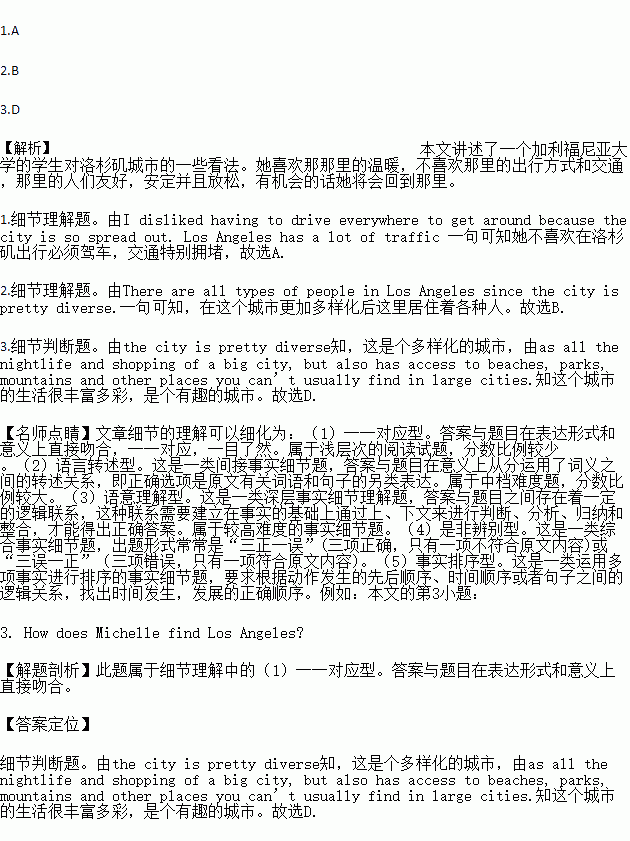题目内容
Michelle was a student at University of California, Los Angeles. She is here to tell us how she feels about the city.
What were the best things about Los Angeles?
One of my favorite things about Los Angeles is the weather. I hate the cold and it never really gets that cold there. Plus, most of the time it’s usually sunny, which is good because I love going to the beach during the summer. There’s so much to do at the beach, but my favorite thing in L.A. was having a picnic on the sand with my friends.
What were the worst things about being there?
I disliked having to drive everywhere to get around because the city is so spread out. Los Angeles has a lot of traffic and sometimes it takes a long time to get somewhere close by just because the streets are so crowded. Also, a lot of people complain about the pollution.
about the pollution.
Did you have any problems there?
Just the normal problems of living in any city, like watching out for pickpockets (扒手). Some people think Los Angeles has a lot of crime, but I think it’s as safe as any other city. Also, many people think driving is difficult because there is a lot of traffic and road rage (路怒症), but it just takes a little practice and a lot of patience.
What are the people like in Los Angeles?
There are all types of people in Los Angeles since the city is pretty diverse. For the most part, though, most of the people are friendly, calm and relaxed. Some people say that everyone in Los Angeles is beautiful, but I think that’s just a stereotype (模式化的印象).
Would you go back to Los Angeles?
Certainly. Los Angeles is one of my favorite cities in the world. I love the fact that it has all the nightlife and shopping of a big city, but also has access to beaches, parks, mountains and other places you can’t usually find in large cities. Between the weather and the beaches and all the fun things to do, it’s a great place to be.
1.We can learn from the text that Michelle _____.
A. hates the heavy traffic in Los Angeles
B. dislikes the cold weather in Los Angeles
C. thinks Los Angeles is small and crowded
D. enjoys driving everywhere in Los Angeles
2.What’s Michelle’s impression of the people in Los Angeles?
A. They get angry easily. B. All sorts of people live there.
C. They are patient and amusing. D. Everyone is kind and beautiful.
3.How does Michelle find Los Angeles?
A. Safe but noisy. B. Relaxing but busy.
C. Polluted and dangerous. D. Diverse and interesting.
 培优好卷单元加期末卷系列答案
培优好卷单元加期末卷系列答案| A. | a better | B. | the better | C. | a best | D. | the best |
| A. | To work | B. | Worked | C. | To be working | D. | Having worked |


 B. proved C. doubted D. showed
B. proved C. doubted D. showed ),并在其下面写出该加的词。
),并在其下面写出该加的词。 tion is more important today than ever before .In Canada mostly children attend public schools. Public schools are mainly found by governments through tax income. Students in Canada taught in English and in French. The rests of Canadian children attend private schools, that are supported mainly by fees paying by parents .By law ,the children must attend the school from age 5 to 16. There are several different levels in the Canadian education system .The first was called Elementary Schools ,which includes kindergartens through grade 7 or 8.
tion is more important today than ever before .In Canada mostly children attend public schools. Public schools are mainly found by governments through tax income. Students in Canada taught in English and in French. The rests of Canadian children attend private schools, that are supported mainly by fees paying by parents .By law ,the children must attend the school from age 5 to 16. There are several different levels in the Canadian education system .The first was called Elementary Schools ,which includes kindergartens through grade 7 or 8.